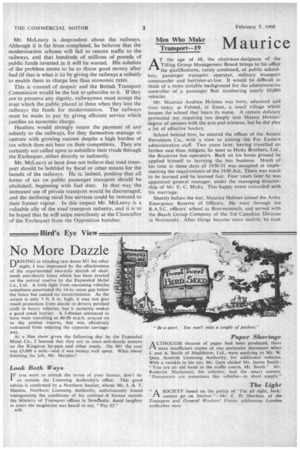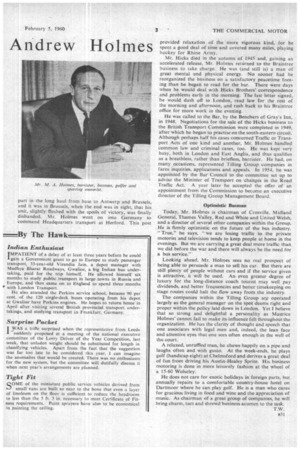Maurice Andrew Holmes
Page 38

Page 39

If you've noticed an error in this article please click here to report it so we can fix it.
AT the age of 48, the chairman-designate of the Tilling Group Management Board brings to his office the qualifications, rarely combined, of public schoolboy, passenger transport operator, military transport commander and barrister-at-law. It would be difficult .to think of a more suitable background for the administrative controller of a passenger fleet numbering nearly 10,000 vehicles.
MI. Maurice Andrew Holmes was born, educated and lives today at Felsted, in Essex, a small village which houses the school that bears its name. A certain delicacy prevented my inquiring too deeply into Master Holmes' degree of success with the arts and sciences, but he did play a lot of effective hockey.
School behind him, he entered the offices of the Asiatic Petroleum Co., with a view to joining the Far Eastern administrative staff. Two years later, having travelled no farther east than Aldgate, he went to Hicks Brothers, Ltd., the Braintree bus operators. Back on his home ground he applied himself to learning the bus business. Much of his time in those days of 1930731 was occupied in implementing the requirements of the 1930 Act. There was much to be learned and he learned fast. Four years later he was appointed general manager, under the managing directorship of Mr. E. C. Hicks. This 'happy event coincided with his marriage.
Shortly before the war, Maurice Holmes joined the Army Emergency Reserve of Officers. He went through the R.A.S.C. officers' school at Bournemouth, and served with the Beach Group Company of the 3rd Canadian Division in Normandy. After things became more mobile, he took
part in the long haul from base to Antwerp and Brussels, and it was in Brussels, when the end was in sight, that his unit, slightly flushed with the spoils of victory, was finally disbanded. Mr. Holmes went on into Germany to command Headquarters transport at Herford. This post
provided relaxation of the more vigorous kind, for he spent a good deal of time and covered many miles, playing hockey for Rhine Army.
Mr. Hicks died in the autumn of 1945 and, gaining an accelerated release, Mr. Holmes returned to the Braintree business to take charge. He was (and still is) a man of great mental and physical energy. No sooner had he reorganized the business on a satisfactory peacetime footing than' he began to read for the bar. There were days when he would deal with Hicks Brothers' correspondence and problems early in the morning. The last letter signed, he would dash off to London, read law for the rest of the morning and afternoon, and rush back to his Braintree office for more work in the evening.
He was called to the Bar, by the Benchers of Gray's Inn, in 1948. Negotiations for the sale of the Hicks business to the British Transport Commission were completed in 1949, after which he began to practise on the south-eastern circuit. Although perhaps half his cases concerned Traffic or Transport Acts of one kind and another, Mr. Holmes handled common law and criminal cases, too. He was kept very busy, both in London and. East Anglia, and thus qualifies as a breathless, rather than briefless, barrister. He had, on many occasions. represented Tilling Group companies in fares inquiries, applications and appeals. In 1954, he was appointed by the Bar Council to the committee set up to advise the Minister of Transport on changes in the Road Traffic Act. A year later he accepted the offer of an appointment from the Commission to become an executive director of the Tilling Group Management Board.
Optimistic Busman
Today, Mr. Holmes is chairman of Crosville, Midland General, Thames Valley, Red and White and United Welsh, and a director of several other companies within the Group. He is firmly optimistic on the future of the bus industry. "True," he says, "we are losing traffic to the private motorist and television tends to keep people at home in the evenings. But we are carrying a great deal more traffic than we did before the war and there will always be the need for
a bus service." ' Looking ahead, Mr. Holmes sees no real prospect of being able to persuade a man to sell his car. But there are still plenty of people without cars and if the service given is attractive, it will be used. An even greater degree of luxury for the long-distance coach tourist may well pay dividends, and better frequencies and better timekeeping on stage routes could halt the flow away from the industry.
The companies within the Tilling Group are operated largely as the general manager on the spot deems right and proper within the policy laid down in London. Yet I believe that so strong and delightful a personality as Maurice Holmes' cannot fail to make its influence felt throughout the organization. He has the clarity of thought and speech that one associates with legal men and, indeed, the lean face and attentive eyes that one secs often enough in the well of the court.
A relaxed, unruffled man, he chews happily on a pipe and laughs often and with gusto. At the week-ends, he plays golf (handicap eight) at Chelmsford and derives a great deal of fun from driving his Austin-Healey Sprite. His business motoring is done in more leisurely fashion at the wheel of a 15-60 Wolseley.
He does not care for exotic holidays in foreign parts, but annually repairs to a comfortable country-house hotel on Dartmoor where he can play golf. He is a man who cares for gracious living in food and wine and the appreciation of music. As chairman of a great group of companies, he will bring charm, tact and shrewd business acumen to the task.
• T.W. B31




























































































































